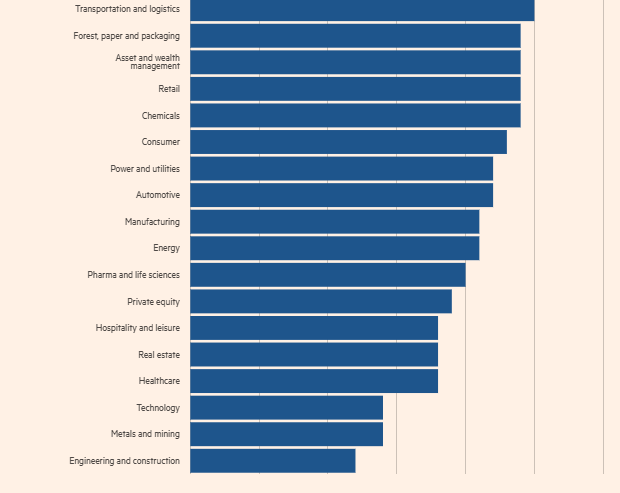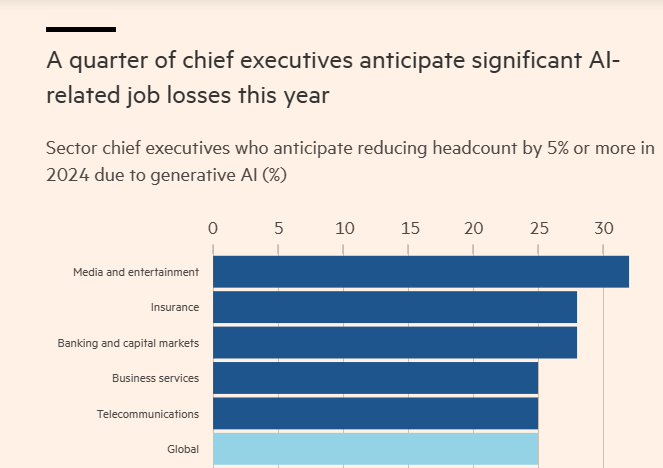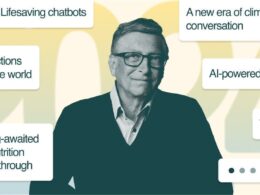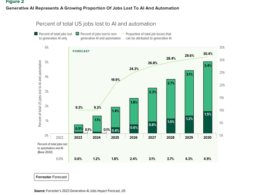The health strategist
research institute, knowledge portal & advisory consulting
for continuous health transformation
and digital health — for all
Joaquim Cardoso MSc.
Servant Leader,
Chief Research & Strategy Officer (CRSO),
Editor in Chief and Senior Advisor
January 16, 2024
xxx
This is an Executive Summary of the article “Generative artificial intelligence will lead to job cuts this year, CEOs say”, published by the Financial Times.
Central Message:
The deployment of generative artificial intelligence (AI) is projected to result in job cuts, with a quarter of global CEOs anticipating a minimum 5% reduction in headcount this year.
This revelation, unveiled at the World Economic Forum in Davos, reflects the far-reaching impacts of AI on various industries and economies.
While executives foresee enhanced profitability through generative AI, concerns persist about its potential to disrupt workforces and societal norms.
Infographic


Executive Summary:
As global leaders convene at the World Economic Forum in Davos, a survey by PwC reveals that 25% of CEOs expect the implementation of generative artificial intelligence to lead to job cuts of at least 5% this year. Industries such as media, entertainment, banking, insurance, and logistics are most likely to predict job losses due to advanced AI tools, contrasting with engineering, construction, and technology firms. Despite concerns, 46% of surveyed executives anticipate generative AI to boost profitability in the next 12 months. However, 47% remain skeptical, predicting little or no change.
The survey, based on interviews with 4,702 CEOs across 105 countries, underscores the pervasive impact of AI on economies and societies.
Executives, including prominent figures like Sam Altman of OpenAI and Satya Nadella of Microsoft, are slated to attend, reflecting the significance of the AI discourse.
While generative AI holds promise for improved profitability, it is also poised to bring about workforce upheaval, leading CEOs to shift their focus from macroeconomic challenges to industry-specific disruptions.
The findings indicate a year of transformation as businesses grapple with the dual challenges of embracing generative AI and addressing the implications of climate change.
Executives foresee economic growth in 2024 but are increasingly concerned about navigating revolutionary developments like AI and climate transitions.
A notable trend is the growing adoption of generative AI, with 32% of executives reporting deployment in the past year.
Expectations include improved product or service quality (58%), necessitating a parallel emphasis on employee upskilling (69%).
The AI-driven automation forecast by Goldman Sachs suggests a potential 7% boost to global GDP over a decade.
Despite these prospects, the PwC survey reveals executives’ primary concerns lie in AI-related risks, particularly cybersecurity and the spread of disinformation. Notably, the study points to receding anxiety about broader economic outlooks, with optimism for better fortunes in 2024, signaling a shift from inflation concerns.
Conclusively, businesses face a pivotal year of transformation marked by the integration of generative AI, demanding strategic workforce management, risk mitigation, and a proactive approach to navigating disruptive forces within their industries.

Conclusions and Recommendations:
Strategic Workforce Management:
Companies should proactively address the anticipated workforce upheaval by implementing strategic plans for reskilling, upskilling, and realigning human capital in response to generative AI adoption.
Risk Mitigation and Cybersecurity:
Prioritize cybersecurity measures to address concerns regarding AI-related risks, particularly in safeguarding against potential cyber threats and the spread of disinformation.
Proactive Industry Engagement:
Business leaders should actively engage with industry-specific disruptive forces, such as generative AI and climate transitions, to stay ahead of the curve and capitalize on opportunities while managing challenges.
Investment in Employee Development:
With a focus on employee upskilling, companies should invest in training programs to equip their workforce with the necessary skills to navigate the changing landscape driven by AI and automation.
Adaptive Business Strategies:
Develop agile business strategies that not only embrace generative AI but also address broader challenges like climate change. This adaptive approach ensures that businesses are well-positioned for sustained success in an era of transformative technological advancements.












